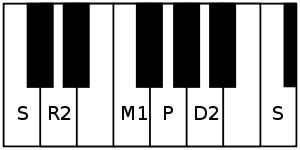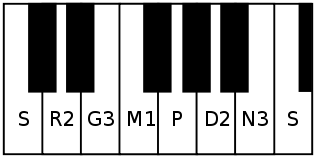Arabhi
Arabhi or Aarabhi (pronounced ārabhi) is a ragam (musical scale) in Carnatic music (South Indian classical music). It is a Janya raga (derived scale), whose Melakarta raga (parent scale, also known as janaka) is Shankarabharanam, 29th in the 72 Melakarta raga system.
| Arohanam | S R₂ M₁ P D₂ Ṡ |
|---|---|
| Avarohanam | Ṡ N₃ D₂ P M₁ G₃ R₂ S |
| Carnatic music |
|---|
Tanjavur-style Tambura |
| Concepts |
| Compositions |
| Instruments |
|
Arabhi is a raga that dates back to 7 AD. Originally, it was called as pazhanthakkam in Ancient Tamil music.
Structure and Lakshana


Its ārohaṇa-avarohaṇa structure (ascending and descending scale) is as follows (see swaras in Carnatic music for details on below notation and terms):
- ārohaṇa : S R₂ M₁ P D₂ Ṡ[lower-alpha 1]
- avarohaṇa : Ṡ N₃ D₂ P M₁ G₃ R₂ S[lower-alpha 2]
Arabhi raga is an Owdava-sampoorna raga meaning, 5 swaras occur in the arohana (so it is called Owdava) and in avarohana all swaras occur (so sampoorna).
It is a raga without much gamakas and frequency variations, relying instead on flat notes. The important point is the swara "ga" always comes very close to "ma" so when we sing the phrase "ma ga ri it sounds like "ma ma ri". Likewise the swara "ni" always comes very close to the swara "sa" hence when we sing the phrase "sa ni da" it sounds like "sa sa da". The closest raga to this one is Devagandhari. There are few aspects which make Arabhi different (though both share the same ascending and descending scale, in terms of basic notation).
- In Arabhi the swara "ga" is close to "ma" but in Devagandhari it is not the same.
- The swara "ri" is not fluctuated in Arabhi but it is given "asaivu" in Devagandhari
- The phrase "pa ma da sa" should not be sung in Arabhi, as it is exclusive for Devagandhari
- Devagandhari is sung with gamakas and vilambita kala prayogas (usages with elongated notes)[1]
- Devagandhari is sung with deergha gandharam (elongated G3)[1]
Arabhi raga is a very energetic and it lends itself to creativity in brigas (fast-paced swara usages) more than gamakas.
Popular Compositions
The 3rd of Pancharatna Kritis (five gems of compositions), Sadhinchanae(also known as "Samayaniki Tagu Mataladene") by Saint Thyagaraja is a famous composition set in Arabhi raga. Here we can note that Thyagaraja uses phrases like "sa sa da" in the charanam although there are phrases like "sa ni da" also.
Here are some more compositions set to Arabhi.
| Type | Composition | Composer | talam |
|---|---|---|---|
| Varnam | Sarasija Mukhiro | Pallavi Doraiswamy Iyer | Adi |
| Varnam | Annamae aravaa | Tiger Varadachariar | Adi |
| Varnam | Amba Gauri | Irayimman Thampi | Adi |
| Kriti | Lalisidalu Magana | Purandara Dasaru | Adi |
| Kriti | Saadinchane O Manasa (3rd Pancharatnam) | Thyagaraja | Adi |
| Kriti | Chaala kallalaadu | Thyagaraja | Adi |
| Kriti | O Rajeevaksha | Thyagaraja | Chapu |
| Kriti | Nada sudha rasa | Thyagaraja | Rupakam |
| Kriti | Patiki Mangala | Thyagaraja | Adi |
| Kriti | Ganarajena rakshitoham | Muthuswamy Dikshitar | Chapu |
| Kriti | Sri Saraswati namostute | Muthuswami Dikshitar | Rupakam |
| Kriti | Shwetaranyeshwaram | Muthuswami Dikshitar | Adi |
| Kriti | Adipuriswaram | Muthuswami Dikshitar | Adi |
| Kriti | Marakoti koti lavanya | Muthuswami Dikshitar | Jhampa |
| Kriti | Palayashumam Paradevate | Syama Sastri | Triputa |
| Kriti | Paahi Parvata Nandini (Navarathri krithi-9th day) | Swathi Thirunal | Adi |
| Kriti | Vande Maheswaram | Swathi Thirunal | Misra Chapu |
| Kriti | Narasimham Mamava | Swathi Thirunal | Khanda Chapu |
| Kriti | Sri Ramana Vibho | Swathi Thirunal | Aadi |
| Kriti | Madhu kaitabha | Muthiah Bhagavathar | Adi |
| Kriti | Durga Lakshmi Saraswati | Papanasam Sivan | Adi |
| Kriti | Maravanu ne ninnu | G. N. Balasubramaniam | Rupakam |
| Kriti | Sri Sakala Ganadhipa | Dr M. Balamuralikrishna | Adi |
| Kriti | Mahadeva Sutham | Dr. M. Balamuralikrishna | Adi |
| Kriti | Mahâ Balavantâ Sri Hanumantâ | Kalyani Varadarajan | Adi |
Film Songs
Language:Tamil
| Song | Movie | Composer | Singer |
|---|---|---|---|
| Yeri Karaiyin Mele | Mudhalali | K. V. Mahadevan | T. M. Soundararajan |
| Thendralil Aadidum | Madhuraiyai Meetta Sundharapandiyan | M. S. Viswanathan | K. J. Yesudas, Vani Jairam |
| Santhakavigal | Metti | Ilaiyaraaja | Brahmanandam |
| Aasai Kiliye | Thambikku Entha Ooru | Malaysia Vasudevan | |
| Madhurai Vaazhum | Pudhupatti Ponnuthayi | Unni Menon, S. Janaki | |
| Mannavane Mannavane | Thanthu Vitten Ennai | S. P. Balasubrahmanyam, S. Janaki | |
| Kaalai Arumbi | Kana Kandaen | Vidyasagar | Srinivas, Kalyani Nair |
| O Sukumari | Anniyan | Harris Jayaraj | Shankar Mahadevan, Harini |
Title Song
| Song | Tv Serial | Composer | Singer |
|---|---|---|---|
| Aadugiran Kannan | Adugiran Kannan | C. Sathya | Srinivas |
Notes
- Alternate notations:
- Hindustani: S R M P D Ṡ
- Western: C D F G A C
- Alternate notations:
- Hindustani: Ṡ N D P M G R S
- Western: C B A G F E D C
References
- Ragas in Carnatic music by Dr. S. Bhagyalekshmy, Pub. 1990, CBH Publications